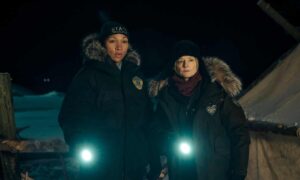At last, this show drops the bloated, male-dominated stories of earlier series for an icy murder case in Alaska – with blistering turns from Foster and Kali Reis.

Full disclosure: I have never been a fan of True Detective, even in its first and, by wide consensus, best instalment. It was so very full of Acting-with-a-capital-A and Directing-with-a-capital-D. When the two subsequent iterations of the anthology series became overwhelmed by the self-indulgences that had always threatened, I took my leave, along with many other viewers.
Now it is back for a fourth season – True Detective: Night Country. It is the first outing without its creator, Nic Pizzolatto, as either showrunner or writer (though he remains as executive producer). There has been radical change: a brutal, beautiful stripping-back by the new writer and director, Issa López. Instead of the broiling sun under which previous detectives, criminals and victims laboured we are now in the fictional mining town of Ennis, Alaska just as day turns into 60 days of night. Malevolence is replaced by stark, spare horror as the new mystery unfolds. It involves the disappearance of all the scientists from the nearby research station, leaving no clues behind but a severed tongue and the words “We are all dead” scribbled on a whiteboard, a possible link to a previous unsolved murder of a native Iñupiat woman, and anti-mine activist, Annie.
Investigating the disappearance of the men is Detective Elizabeth Danvers. She is played by Jodie Foster, who is as compelling and unsentimental as the frozen landscape Danvers roams and one of those actors who, when you see her doing her thing, makes you wonder why she isn’t in everything all the time. Danvers was “promoted” to this barren outpost a few years ago as, it is suggested, a backhanded punishment for her attitude. She is someone who if she were a man would be revered as a hard-bitten lone wolf, but as a woman is generally considered a bit of a bitch, even if no one dares say it out loud. Fortunately, she is also of an age as well as a temperament not to care.
Reluctantly partnering her in the investigation (“You want in?” offers Danvers, with characteristic brevity, “Or you wanna go fuck yourself?”) is the Iñupiat state trooper Evangeline Navarro, played by the former boxer Kali Reis in her small screen debut and showing she has talent and presence to burn. Navarro was obsessed with Annie’s case and insists there is a connection between the two. But she and Danvers had a messy professional breakup, whose details only gradually surface, and a relationship of easy camaraderie it is not.

True Detective has always flirted with supernatural elements and does so again. But here, in the isolated town in an inescapably eerie land that knows darkness for months at a time, they feel less like a narrative flourish than the most likely explanation for everything. When gutted caribou carcasses jerk with life, when a clump of bodies is found frozen in terror in the middle of a wasteland, it makes sense at some visceral, primal level to look at least as much to the Iñupiat’s belief in the spirit world, in the porous border between the living and the dead, as it does to look to the police. López doesn’t overplay it, just incorporates it enough to tap into our deepest fears while Danvers follows the facts.
Racial and sexual politics too are woven into the whole. The Iñupiat people are treated as second-class citizens. Domestic violence is rife in the town. Danvers is treated with the barest respect, her job title only just countering her status as an older and unfeminine woman. But there are more immediate problems to be solved. Who is funding the research station (which is on the verge of a gamechanging breakthrough in the treatment of cancer and other diseases), who owned the tongue left on the floor, how will Danvers stop the case being taken over by the higher powers in Anchorage, and quite how do you defrost an enormous clutch of bodies to preserve any evidence left behind?
Night Country is a brilliant inversion of the men-heavy, heat-oppressed, narratively bloated series that have gone before. López has kept the off-kilter essence of the thing but made it – with the help of Foster, Reis and an array of other fine actors, including Fiona Shaw and Christopher Eccleston – its own thing. She has created a brooding, melancholy world of terrible possibilities and made True Detective not just worth watching again but more so than ever.

